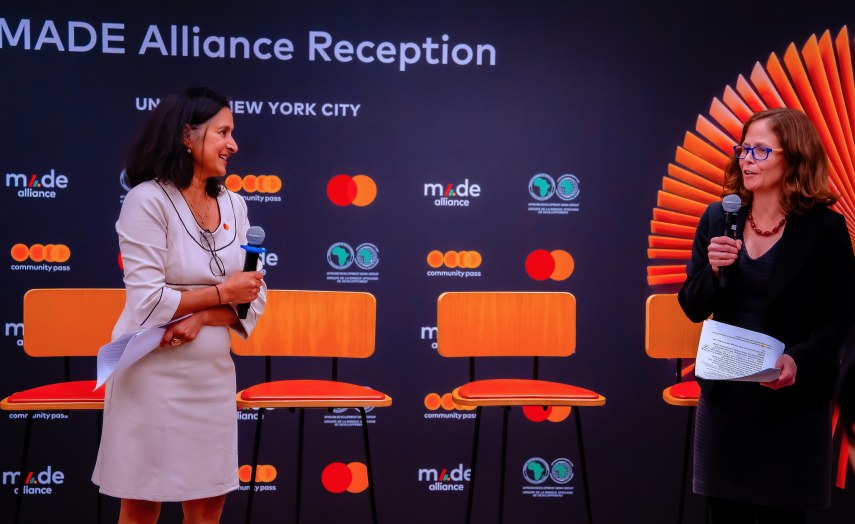
By Charles Muchoki | Africa Guardian
There’s a $1 trillion-a-year economic sector in Africa where most workers remain invisible. African Development Bank Group President Akinwumi A. Adesina says, “Farmers are the folks you don’t see—banks, buyers, traders, and insurance companies don’t see them.”
These smallholder farmers often live in remote areas, with limited access to markets and unreliable connectivity, leaving them without a digital presence. This restricts their ability to secure better prices, access loans, and utilize advanced agricultural inputs like climate-resistant seeds.
To address this, the MADE Alliance (Mobilizing Access to the Digital Economy: Africa) was launched in May. Its goal is to provide 100 million people and businesses in Africa with digital access to essential services over the next decade. With a $300 million commitment in its first phase, the African Development Bank plans to bring 3 million farmers in Kenya, Tanzania, and Nigeria into the digital economy through Mastercard’s Community Pass. This digital credential gives farmers access to a network of agricultural agents.
Since its launch, several programs have rolled out, including affordable digital financial services for sunflower farmers in Tanzania, internet connectivity and digital skills training for Kenyan farmer cooperatives, and clean energy asset financing for farmers.
At a recent meeting during the 79th UN General Assembly, Adesina, Mastercard President Jon Huntsman, and other partners reviewed MADE’s progress. The meeting celebrated the launch of the Alliance’s Tanzania and Kenya chapters.
Why Focus on Agriculture and Women?
Beth Dunford, Vice President for Agriculture at the African Development Bank, explains why MADE is focused on agriculture and women farmers. Africa holds 65% of the world’s remaining uncultivated arable land, and agriculture is critical for the continent’s development. The sector accounts for 60% of employment and over 25% of GDP in low-income countries. Women provide up to 80% of the labor, making them key to agriculture in Africa. Growth in agriculture is highly effective at lifting people out of poverty, empowering women, and positioning Africa as a global food supplier.
However, most of Africa’s food producers are smallholder farmers who struggle due to a lack of quality inputs, financing, and resources. MADE aims to solve these issues by providing digital access to essential services. Mastercard’s Community Pass collaborates with local banks to provide digital identities for farmers, which is crucial for accessing services like high-quality inputs. Currently, 99% of agriculture transactions in Africa are cash-based, and digitizing this process can bring efficiency, reduce waste, and limit fraud.
Challenges and Solutions for Digitalizing Agriculture
Bringing solutions like Community Pass to remote areas with limited connectivity and energy access is challenging. However, Mastercard’s technology meets farmers “where they are.” Scaling this technology requires working with farmer cooperatives, though many in Africa lack efficiency, and digital literacy is low. Significant investment in educating farmers about digital technology’s benefits is necessary.
Transporting goods to market remains another challenge, but digital services can connect farmers with distant buyers and suppliers. Additionally, reliable connectivity and access to devices are crucial for farmers to participate in the digital economy.
Local governments see the value of digitization in agriculture but need clear models for engaging with the private sector to build a robust digital ecosystem. Centralizing digital infrastructure can inhibit private-sector involvement and hinder sustainable service models for agricultural communities.
Empowering Women Farmers
Women farmers, who make up half of Africa’s smallholder farmers, face additional challenges compared to men. They typically lack property titles and assets needed for financial services, have less access to agricultural inputs, and are disproportionately affected by climate risks. As a result, they produce 20-30% less than male farmers.
Community Pass helps women create sustainable livelihoods by connecting them to essential services like banks and agricultural buyers. This technology fosters transparency and empowers women entrepreneurs, benefiting families, communities, and the broader economy. Investing in women has been a core focus of the African Development Bank, with all its projects required to demonstrate how they will benefit women.
The Role of the Private Sector and Governments
The MADE Alliance brings together partners like Equity Bank Group, Microsoft, and Heifer Foundation to develop sustainable, private sector-led solutions. These partnerships are designed to be commercially viable, with donors and governments providing catalytic funding and regulatory support to mitigate risks for private-sector involvement in agriculture.
Every MADE Alliance program is anchored by a private-sector entity, with other partners offering complementary services to bring these initiatives to life. This approach ensures that sustainability aligns with profitability, benefiting both the private sector and smallholder farmers across Africa.
___
